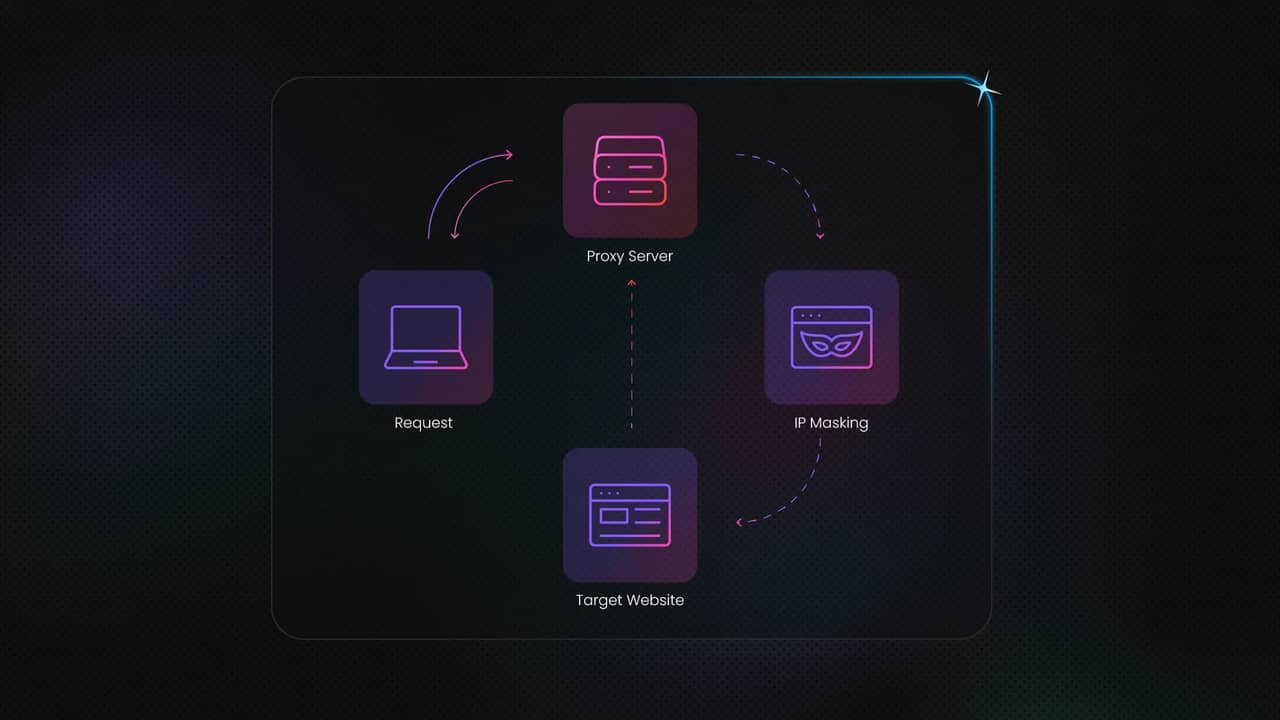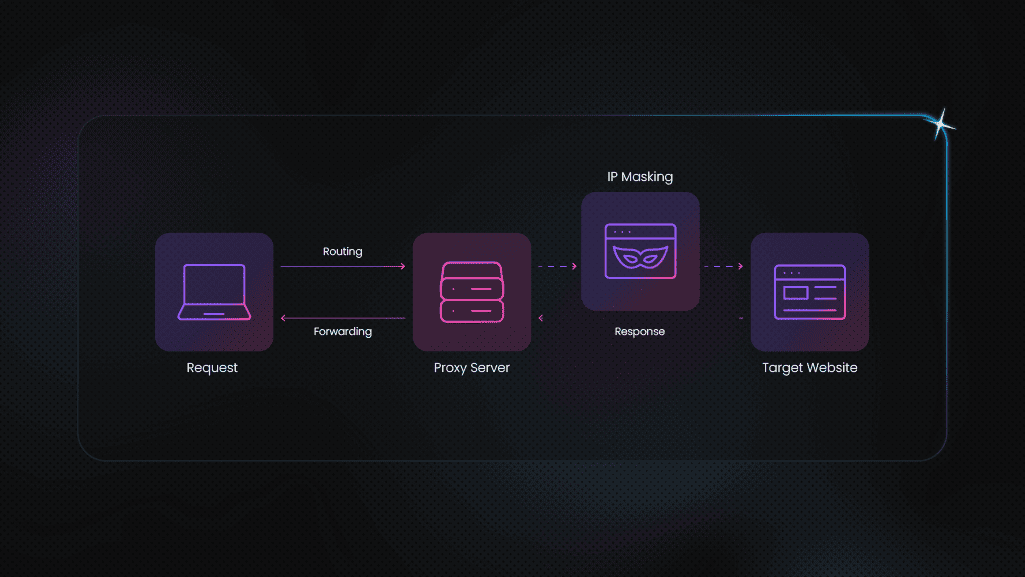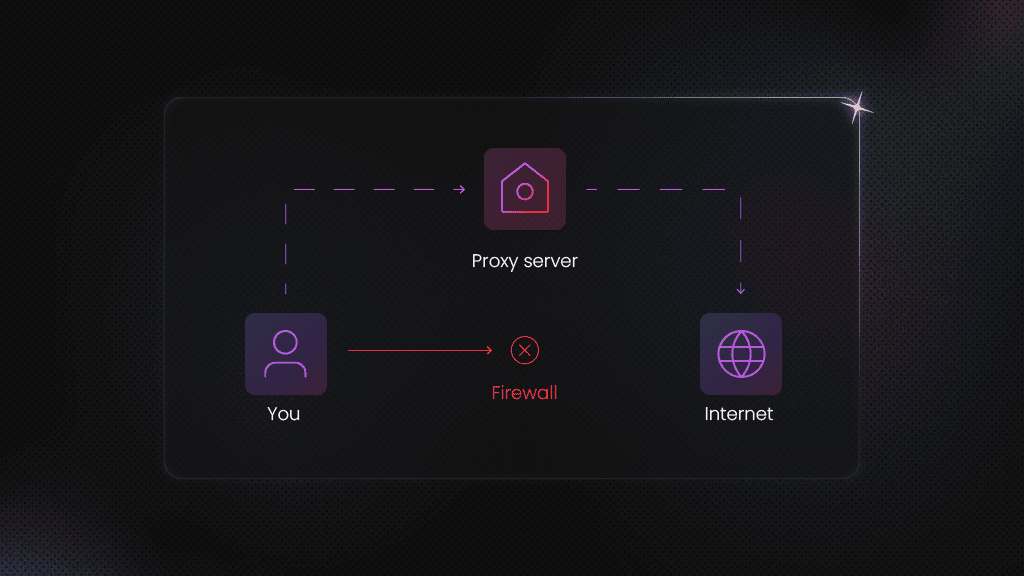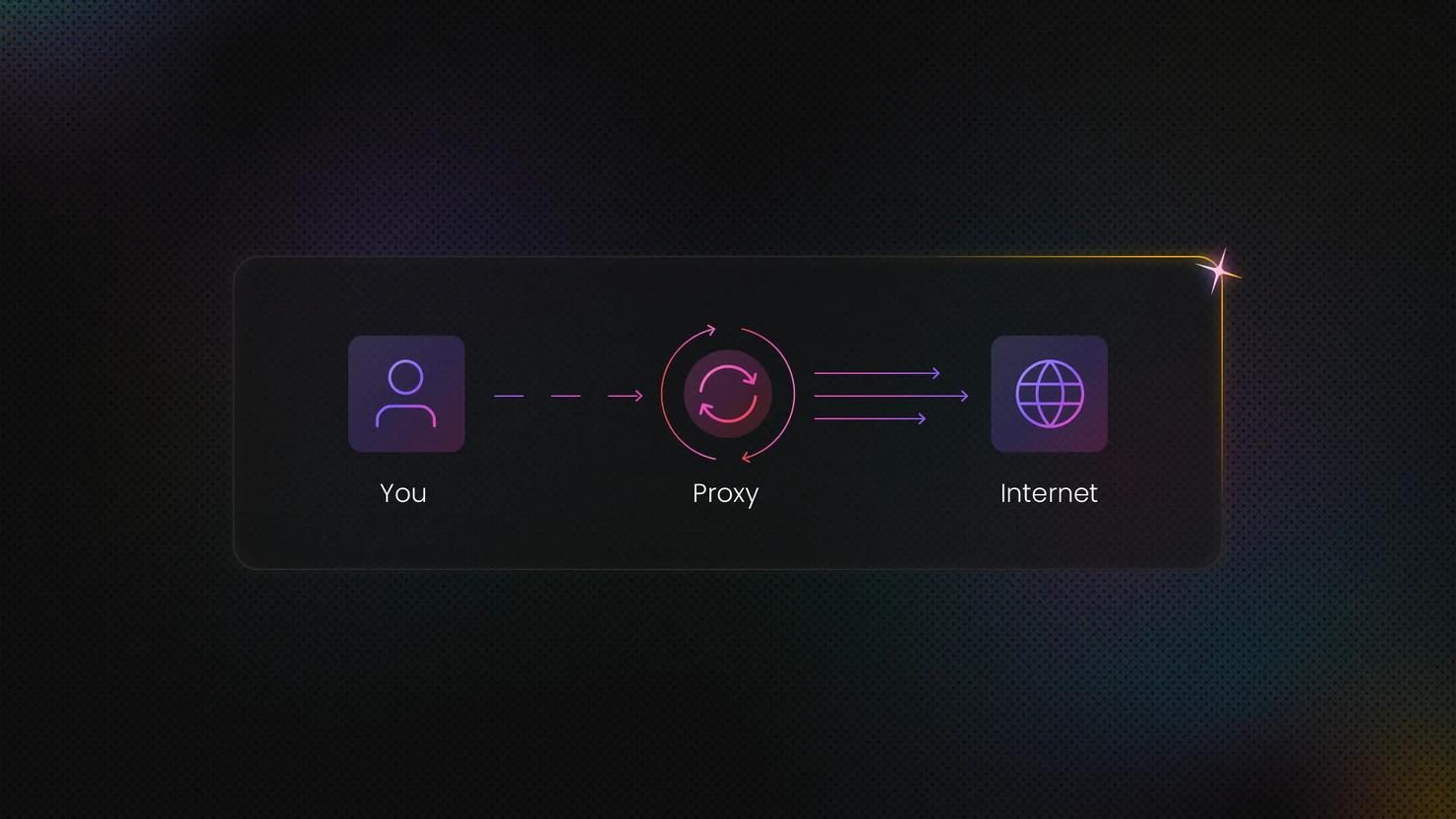What Is a Dedicated Proxy? Key Types & Benefits
Ever feel like you're sharing a slow lane on the information highway? Standard proxies act as intermediaries, masking your IP address for privacy or accessing geo-specific web data. But when performance and a clean reputation matter most, dedicated proxies step in as a powerful solution offering exclusive access, speed, and stability tailored to your needs.
Lukas Mikelionis
Last updated: May 06, 2025
4 min read

What is a dedicated proxy?
A dedicated proxy is an Internet Protocol (IP) address assigned for the exclusive use of a single client. This differs from shared proxies, where multiple users use the same IP address simultaneously, which can lead to performance inconsistencies or access restrictions because of shared usage and reputation.
This exclusivity is ideal for users and businesses needing consistent performance, heightened security, and a stable online identity without worrying about the restrictions. Rotating proxies, on the other hand, provide a pool of IPs that change frequently, which suits different use cases requiring high IP diversity rather than stability.
If exclusive IP access sounds right for your project, explore the dedicated proxy options.
How do dedicated proxies work?
Using a dedicated proxy is straightforward from a user perspective, but understanding the mechanics helps appreciate its value:

- Request – your device sends a connection request intended for a target website (e.g., an eCommerce site).
- Routing – instead of going directly, the request first hits your dedicated proxy server.
- IP masking – the proxy server forwards your request to the target website, but it replaces your original IP address with its dedicated IP. The website only sees the proxy's IP.
- Response – the website returns its response to the proxy server.
- Forwarding – the proxy server relays the response back to your device.
This process provides anonymity by masking your true IP and ensures a consistent identity because you're always appearing from the same dedicated IP address. This consistency is crucial for tasks like:
- Web scraping – maintaining stable sessions for complex data gathering tasks, reducing the chance of blocks based on IP reputation.
- Account management – handling multiple eCommerce store accounts or business profiles reliably without triggering security flags associated with inconsistent IPs.
- Privacy – enhancing online privacy by shielding your IP from visited websites.
Types of dedicated proxies
While the core concept is exclusivity, dedicated tag can be seen on different proxy types:
- Dedicated datacenter proxies – these are the most common type. The IPs originate from servers housed in data centers. They offer high speeds, excellent uptime, and are cost-effective. Because they come from known datacenter subnets, they might be easier for some sophisticated websites to detect compared to residential IPs, making datacenter proxies best for less sensitive targets or high-volume tasks where speed is paramount.
- Dedicated residential proxies (static ISP proxies) – true residential proxies use IPs from real user devices (laptops, mobiles) connected via Internet Service Providers (ISPs). By nature, these are usually dynamic and shared. However, the term "dedicated residential" often refers to static ISP proxies. These IPs are hosted in data centers for speed and stability but are officially registered under an ISP. This gives them the appearance and legitimacy of a residential IP, making them much harder to detect, while still offering a static, dedicated assignment. They blend the speed benefits of datacenter infrastructure with the high anonymity of residential IPs, which is ideal for scraping sensitive targets or managing accounts requiring authentic-looking connections.
Benefits of using dedicated proxies
Why choose a dedicated IP over other options, you might ask? We've got a full list of benefits:
- Speed and high performance – you get the full bandwidth and resources of the proxy server. No sharing means no slowdowns caused by other users.
- Security and privacy – exclusive use significantly reduces the risk of your IP being associated with malicious activities carried out by others, enhancing your operational security.
- Stability and reliability – consistency is key. A dedicated IP is less prone to being banned since you have control over its usage history. This leads to smoother, uninterrupted sessions for scraping or account management.
- Avoiding blacklists – since you're the only user, the IP's reputation is entirely in your hands. You begin with a fresh start, ensuring that you don't carry over any possible issues or restrictions from prior users.
Dedicated proxies with 99.98% success rates
Get IPs exclusively assigned to you and collect data without a single restriction.
Drawbacks of dedicated proxies
Like any proxy type, dedicated proxies also have a few drawbacks:
- Cost – exclusivity comes at a higher price. Dedicated IPs typically cost more per IP than shared proxy options because the provider dedicates resources solely to you.
- Smaller IP pool – you're working with specific assigned IPs. This contrasts with rotating services that might offer access to millions of IPs, which can be beneficial for tasks requiring massive scale and constant IP changes.
- Configuration complexity – while providers like Decodo aim for ease of use, managing dedicated IPs might sometimes require more hands-on setup or maintenance compared to fully managed rotating proxy services, especially if you need to handle rotation manually across your dedicated pool.
Top use cases for dedicated proxies
Dedicated proxies shine in scenarios demanding stability and a clean IP history:
- Web scraping – essential for accessing websites sensitive to IP reputation or for long, uninterrupted scraping sessions. Great for market research or price intelligence gathering.
- Bypassing geo-restrictions – accessing web content, services, or pricing information specific to a particular geographic location as if you were physically there.
- Account management – reliably managing multiple accounts on platforms like eCommerce marketplaces, ensuring each profile maintains a consistent, trustworthy digital footprint.
- Ad verification and SEO monitoring – checking ad placements or search engine rankings from specific locations accurately, ensuring ads are displayed correctly and SEO efforts are viewed from the target audience's perspective.
How to choose a dedicated proxy provider
Selecting the right provider is crucial. Look for:
- Top-notch performance – evaluate providers based on speed benchmarks, guaranteed uptime (look for 99% and up), quality of customer support (especially 24/7 tech help), user reviews and reputation, and transparent pricing.
- Proxy type – decide between dedicated datacenter and static ISP proxies based on your target websites' sensitivity and your budget. ISP proxies offer higher anonymity but usually cost more.
- Extras – consider ease-of-use features like a clear user dashboard, simple authentication methods (username:password, IP whitelisting), and any available IP rotation features or management tools for your dedicated pool.
And while tempting, using free proxy services poses significant risks and should generally be avoided for any use case. Be aware that free proxies often come with security vulnerabilities, data theft, malware injection, poor performance and reliability, compromised IP reputation or unethical sourcing, so instead of masking your IP from everyone, you're revealing it to hackers.
Steps for acquiring dedicated proxies
Getting dedicated proxies involves a process centered around choosing a reliable provider and the right product for your needs.
- Define your requirements – determine the type of dedicated proxy required (e.g., datacenter proxies for speed-focused tasks or static ISP proxies for higher anonymity), the number of exclusive IPs necessary for your project, and the specific geographic locations you need the IPs to originate from.
- Select a reputable provider – choose a trusted provider known for quality service, reliable uptime, and good customer support, like Decodo.
- Choose a specific plan or product – after registering to the dashboard and select the plan that best matches your needs in terms of proxy type, IP quantity, location, and contract duration, go ahead and complete the purchase.
- Receive access credentials – once the purchase is confirmed, you'll then get the access to your dedicated proxies. This includes accessing a user dashboard to find the list of assigned IP addresses, port numbers, and authentication details.
- Configure and integrate – input the provided proxy credentials into your specific application, software, browser extension, or custom script that needs to route traffic through the dedicated proxies. You can also follow our quick start guide for even faster dedicated proxy setup experience.
- Test your proxies – before starting to use your dedicated proxies, perform tests to ensure they're establishing the connection, routing traffic from a different IP, and delivering the expected performance. Verify that target websites are accessible via the new IPs.
Bottom line
A dedicated proxy gives you exclusive control over a specific IP address, translating directly into enhanced performance, reliability, and security for your online tasks. While shared or rotating proxies have their place, dedicated IPs are invaluable when consistency and a clean reputation are non-negotiable. By getting to know the different types, advantages, and limitations, you can evaluate if they align with your goals for web scraping, account management, or geo-targeting.
Dedicated proxies with 99.99% uptime
High-performance dedicated premium quality IPs with unlimited traffic.
About the author

Lukas Mikelionis
Senior Account Manager
Lukas is a seasoned enterprise sales professional with extensive experience in the SaaS industry. Throughout his career, he has built strong relationships with Fortune 500 technology companies, developing a deep understanding of complex enterprise needs and strategic account management.
Connect with Lukas via LinkedIn.
All information on Decodo Blog is provided on an as is basis and for informational purposes only. We make no representation and disclaim all liability with respect to your use of any information contained on Decodo Blog or any third-party websites that may belinked therein.

